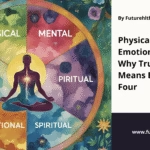Physical Mental Emotional Spiritual: Why True Health Means Balancing All Four

When was the last time you checked in not just with your body, but with your mind, heart, and soul? In our busy world, we often focus on physical health. We forget about our emotional struggles, mental tiredness, and spiritual emptiness. Yet, true wellness is not one-dimensional it’s a harmony of physical, mental, emotional, and spiritual health.
If you have ever asked, “Is physical health more important than mental health?” you are not alone. You may have also wondered why you feel off. This guide will change how you think about well-being forever.
The Four Key Components of Health
Physical Health: The Foundation of Wellness
Physical health is usually the first thing that comes to mind. About how effectively your body operates regarding fitness, diet, rest, and healthcare.
Key factors that shape physical health:
- Regular exercise and movement
- Balanced, nutrient-rich diet
- Adequate sleep (7–9 hours)
- Preventive care (checkups, screenings)
- Avoiding harmful habits (smoking, alcohol abuse)
Real-life tip: Start small. A 20-minute walk after dinner or swapping soda for water can kick-start physical transformation.
Mental Health: The Command Center
Mental health impacts how we think, learn, and make decisions. It also governs resilience the ability to bounce back from stress.
But here’s the truth: Mental and physical health connect deeply. Mental stress can lead to physical illness, and vice versa. Ever had a headache from anxiety? Or felt sluggish because of depression?
Boost mental health with:
- Journaling your thoughts
- Taking breaks from screens
- Practicing mindfulness
- Seeking professional support when needed
“Mental health is more important than physical health for long-term happiness.” — Mental wellness coach, Sarah Klein
Emotional Health: The Heart of Wellness
People often confuse emotional health with mental health. It shows your ability to recognize, express, and manage emotions. Good emotional health helps you build relationships and face life’s challenges.
Improve your emotional well-being by:
- Naming your emotions (e.g., angry, anxious, excited)
- Practicing gratitude daily
- Setting healthy boundaries
- Talking to trusted friends or therapists
Long-term studies show that emotional intelligence correlates more with success than IQ.
Emma is a 42-year-old teacher. She learned her burnout was not from overwork but from emotional exhaustion. Through therapy and writing, she learned to manage her feelings. She also renewed her love for teaching.
Spiritual Health: Your Inner Compass
Spiritual health is not just about religion. Finding meaning, purpose, and a connection to something bigger than yourself is what matters.
Many people often overlook this part, but it greatly affects how fulfilled we feel.
Ways to nurture spiritual well-being:
- Meditation or prayer
- Spending time in nature
- Volunteering
- Reflective practices like gratitude or affirmations
Question to ask: What gives my life purpose?
How Many Components of Health Are There, Truly?
The five commonly accepted pillars of health are:
- Physical
- Mental
- Emotional
- Spiritual
- Social
Together, they create what’s called holistic wellness. Ignoring even one can lead to imbalance.
A Circle, Not a Ladder: Emotional, Physical, Mental, Spiritual, Social
These areas are interconnected not hierarchical.
For example:
- Emotional trauma can trigger physical symptoms
- Poor physical health can lead to depression
- Lack of spiritual direction can breed anxiety
Think of your health as a circle each component strengthens the whole.
What It Means to Age Well: Mentally, Physically, Emotionally, Spiritually
As we age, health isn’t just about avoiding disease it’s about staying engaged in all four dimensions:
1. Physical: Staying active, eating well, maintaining mobility
2. Mental: Continuing to learn, solving problems, memory exercises
3. Emotional: Staying connected, managing grief and transitions
4. Spiritual: Finding peace, leaving a legacy, living purposefully
Aging gracefully isn’t luck it’s holistic preparation.
Why Balancing All Four Areas Matters More Than Ever
In a 2023 wellness survey, 72% of respondents said they felt healthy physically but still felt unwell overall.
Why? Because true wellness isn’t just muscle and vitamins—it’s:
- Mental clarity
- Emotional balance
- Spiritual peace
Today’s world demands a mentally, physically, emotionally, and spiritually strong version of yourself.
“Wellness is the full connection of body, mind, and spirit. It means that everything we do, think, feel, and believe affects our well-being.” Greg Anderson
What Factors Make Up Wellness? A Quick Recap
- Physical: Fitness, diet, sleep
- Mental: Thoughts, learning, coping
- Emotional: Feelings, relationships
- Spiritual: Purpose, beliefs, meaning
- Social (bonus!): Community, support systems
Featured Snippet-Friendly Section: What Does ‘Physically, Mentally, Emotionally, Spiritually’ Mean?
It means achieving balance in four core areas of life:
- Physical health: Taking care of your body
- Mental health: Keeping your mind clear and focused
- Emotional health: Understanding and managing your feelings
- Spiritual health: Finding purpose and inner peace
This holistic view of health leads to sustainable wellness and resilience.
Final Thoughts: Aim for Harmony, Not Perfection
You don’t have to master every pillar overnight. Start where you are. Focus on the area that is most out of balance. Take small, steady steps to improve it.
True health means thriving in all areas: physically, mentally, emotionally, and spiritually. Not just about surviving.
Ready to take control of your total wellness? Begin today—one step, one breath, one mindful choice at a time.

Dr. Anna Wells
Dr. Anna Wells simplifies complex medical topics into practical advice. She writes to help readers understand symptoms, treatments, and wellness strategies for a healthier life.






